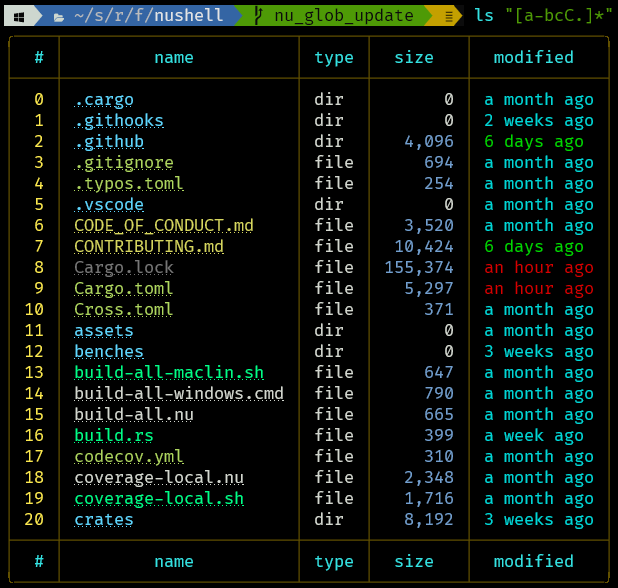# Description
This removes some unnecessary SyntaxShapes when parsing a
SyntaxShape::Any. Recent updates to the parser look for `{` and then
handle the logic for that separately.
# User-Facing Changes
This may have a slight parser speedup.
# Tests + Formatting
<!--
Don't forget to add tests that cover your changes.
Make sure you've run and fixed any issues with these commands:
- `cargo fmt --all -- --check` to check standard code formatting (`cargo
fmt --all` applies these changes)
- `cargo clippy --workspace -- -D warnings -D clippy::unwrap_used -A
clippy::needless_collect -A clippy::result_large_err` to check that
you're using the standard code style
- `cargo test --workspace` to check that all tests pass
- `cargo run -- crates/nu-std/tests/run.nu` to run the tests for the
standard library
> **Note**
> from `nushell` you can also use the `toolkit` as follows
> ```bash
> use toolkit.nu # or use an `env_change` hook to activate it
automatically
> toolkit check pr
> ```
-->
# After Submitting
<!-- If your PR had any user-facing changes, update [the
documentation](https://github.com/nushell/nushell.github.io) after the
PR is merged, if necessary. This will help us keep the docs up to date.
-->
# Description
This PR updates `nu-glob` to add the latest changes and updates from
`rust-lang/glob` [v0.3.1](https://github.com/rust-lang/glob).
With these changes you can do this type of globbing
```rust
/// - `?` matches any single character.
///
/// - `*` matches any (possibly empty) sequence of characters.
///
/// - `**` matches the current directory and arbitrary subdirectories. This
/// sequence **must** form a single path component, so both `**a` and `b**`
/// are invalid and will result in an error. A sequence of more than two
/// consecutive `*` characters is also invalid.
///
/// - `[...]` matches any character inside the brackets. Character sequences
/// can also specify ranges of characters, as ordered by Unicode, so e.g.
/// `[0-9]` specifies any character between 0 and 9 inclusive. An unclosed
/// bracket is invalid.
///
/// - `[!...]` is the negation of `[...]`, i.e. it matches any characters
/// **not** in the brackets.
///
/// - The metacharacters `?`, `*`, `[`, `]` can be matched by using brackets
/// (e.g. `[?]`). When a `]` occurs immediately following `[` or `[!` then it
/// is interpreted as being part of, rather then ending, the character set, so
/// `]` and NOT `]` can be matched by `[]]` and `[!]]` respectively. The `-`
/// character can be specified inside a character sequence pattern by placing
/// it at the start or the end, e.g. `[abc-]`.
```
Example - with character sequences

Example - with character sequence negation

Example - normal globbing

Example - with character sequences

Not that, if you're using a character sequence by itself, you need to
enclose it in quotes, otherwise nushell will think it's a range. But if
you already have a type of a bare word already, no quotes are necessary,
as in the last example.
# User-Facing Changes
<!-- List of all changes that impact the user experience here. This
helps us keep track of breaking changes. -->
# Tests + Formatting
<!--
Don't forget to add tests that cover your changes.
Make sure you've run and fixed any issues with these commands:
- `cargo fmt --all -- --check` to check standard code formatting (`cargo
fmt --all` applies these changes)
- `cargo clippy --workspace -- -D warnings -D clippy::unwrap_used -A
clippy::needless_collect -A clippy::result_large_err` to check that
you're using the standard code style
- `cargo test --workspace` to check that all tests pass
- `cargo run -- crates/nu-std/tests/run.nu` to run the tests for the
standard library
> **Note**
> from `nushell` you can also use the `toolkit` as follows
> ```bash
> use toolkit.nu # or use an `env_change` hook to activate it
automatically
> toolkit check pr
> ```
-->
# After Submitting
<!-- If your PR had any user-facing changes, update [the
documentation](https://github.com/nushell/nushell.github.io) after the
PR is merged, if necessary. This will help us keep the docs up to date.
-->
I have changed `assert!(a == b)` calls to `assert_eq!(a, b)`, which give
better error messages. Similarly for `assert!(a != b)` and
`assert_ne!(a, b)`. Basically all instances were comparing primitives
(string slices or integers), so there is no loss of generality from
special-case macros,
I have also fixed a number of typos in comments, variable names, and a
few user-facing messages.
* Remove unnecessary `#[allow]` annots
Reduce the number of lint exceptions that are not necessary with the
current state of the code (or more recent toolchain)
* Remove dead code from `FileStructure` in nu-command
* Replace `allow(unused)` with relevant feature switch
* Deal with `needless_collect` with annotations
* Change hack for needless_collect in `from json`
This change obviates the need for `allow(needless_collect)`
Removes a pessimistic allocation for empty strings, but increases
allocation size to `Value`
Probably not really worth it.
* Revert "Deal with `needless_collect` with annotations"
This reverts commit 05aca98445.
The previous state seems to better from a performance perspective as a
`Vec<String>` is lighter weight than `Vec<Value>`
* allow for test_iteration_errors to work when run as root
* Add comment to skip condition
Co-authored-by: Stefan Holderbach <sholderbach@users.noreply.github.com>
* Add android as target os for procfs-based ps
* Turn off code for dealing with trash on platforms which are known to not support a standard trash protocol
* Update lib.rs
* Update lib.rs
Co-authored-by: JT <547158+jntrnr@users.noreply.github.com>